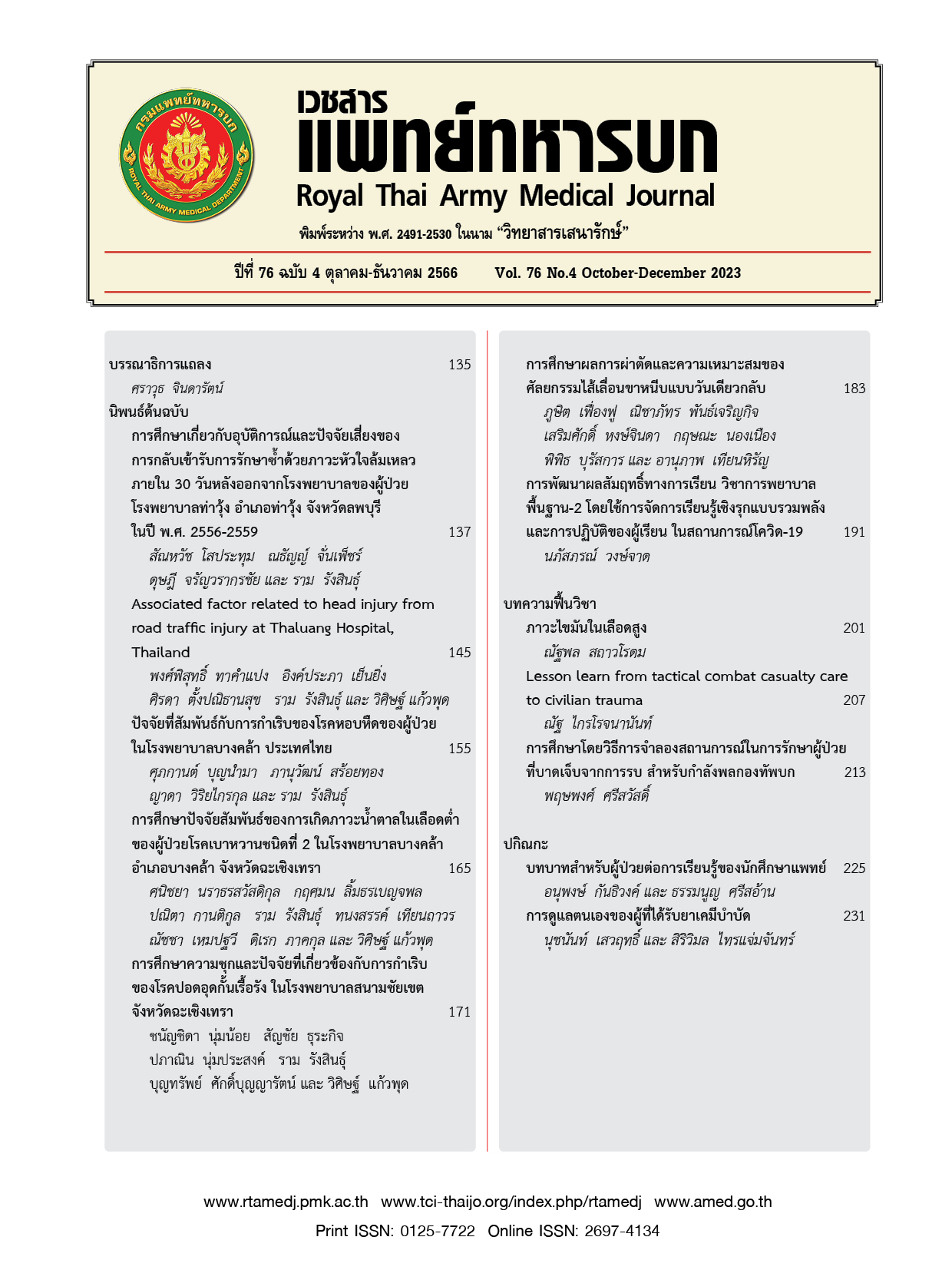ปัจจัยที่สัมพันธ์กับการกำเริบของโรคหอบหืดของผู้ป่วยในโรงพยาบาลบางคล้า ประเทศไทย
Main Article Content
บทคัดย่อ
ความเป็นมาและวัตถุประสงค์ โรคหืดเป็นโรคที่มีการอักเสบเรื้อรังของทางเดินหายใจส่วนล่าง เมื่อถูกกระตุ้นให้เกิดอาการกำเริบฉับพลันของโรคหืด ทำให้ผู้ป่วยสูญเสียสมรรถภาพในการใช้ชีวิตประจำวันและอาจรุนแรงจนนำไปสู่การเสียชีวิตได้ ซึ่งในปัจจุบันยังมีงาน วิจัยที่ศึกษาเรื่องปัจจัยที่มีผลสัมพันธ์กับการกำเริบของหอบหืดในโรงพยาบาลระดับปฐมภูมิไม่มาก โดยเป้าหมายในการศึกษาครั้งนี้เพื่อหาปัจจัยที่จะลดความเสี่ยงที่จะเกิดอาการกำเริบฉับพลันในอนาคต ซึ่งจะช่วยให้ผู้ป่วยมีคุณภาพชีวิตที่ดีขึ้น ลดการกำเริบฉับพลันของโรคหืด และช่วยลดการเสียชีวิตจากโรคหืดได้ รูปแบบการวิจัย เป็นการศึกษาแบบ Cross-sectional study โดยทำการ ศึกษาในประชากรผู้ป่วยโรคหอบหืดที่มีอายุมากกว่า 3 ปีขึ้นไป จำนวน 258 ราย ในโรงพยาบาลบ้างคล้าในช่วง มกราคม 2558 ถึง กันยายน 2561 โดยข้อมูลที่นำมาศึกษาที่ได้มาจากข้อมูลจากเวชระเบียนออนไลน์ในฐานข้อมูลทางคอมพิวเตอร์ของโรงพยาบาล และจากใบบันทึกเวชระเบียนแบบกระดาษที่ถูกบันทึกโดยเจ้าหน้าที่ โดยการกำเริบของโรคหืด หมายถึง ผู้ป่วยมีอาการของโรคหืดจนต้องมาโรงพยาบาล เพื่อให้ยาพ่นขยายหลอดลมและยา corticosteroid และหมายถึงผู้ป่วยต้องเข้ารับการรักษาในโรงพยาบาลหรือได้รับการส่งต่อเนื่องจากโรคหืด ผลการวิเคราะห์ข้อมูล การที่ผู้ป่วยไม่มาตามนัดตั้งแต่ 2 ครั้งขึ้นไป และการมีอัตราการครองยาที่ ไม่เหมาะสม (MPR < 80%) มีผลเพิ่มโอกาสที่ผู้ป่วยจะเกิดหอบหืดกำเริบจนต้องมารับการที่รักษาที่ห้องฉุกเฉิน หรือรับไว้รักษาในโรงพยาบาลอย่างมีนัยสำคัญทางสถิติ สรุป โรคหอบหืดเป็นโรคที่ต้องทำการรักษาอย่างต่อเนื่อง การที่ผู้ป่วยไม่ใช้ยาและการขาดนัดติดตามอาการ มีความสัมพันธ์ที่ผู้ป่วยจะเกิดหอบหืดกำเริบ ดังนั้นการที่บุคลากรทางการแพทย์ให้ความสำคัญกับเรื่องการเน้นย้ำให้ผู้ป่วยใช้ยาอย่างสม่ำเสมอ และการมาตามนัดอย่างต่อเนื่องจึงเป็นเรื่องที่สำคัญอย่างยิ่งที่จะช่วยลดการกำเริบฉับพลันของโรคหืด ลดการนอนโรงพยาบาลและช่วยลดการเสียชีวิตจากโรคหืดได้อย่างมีนัยสำคัญทางสถิติ
Downloads
Article Details

อนุญาตภายใต้เงื่อนไข Creative Commons Attribution-NonCommercial-NoDerivatives 4.0 International License.
บทความในวารสารนี้อยู่ภายใต้ลิขสิทธิ์ของ กรมแพทย์ทหารบก และเผยแพร่ภายใต้สัญญาอนุญาต Creative Commons Attribution-NonCommercial-NoDerivatives 4.0 International (CC BY-NC-ND 4.0)
ท่านสามารถอ่านและใช้งานเพื่อวัตถุประสงค์ทางการศึกษา และทางวิชาการ เช่น การสอน การวิจัย หรือการอ้างอิง โดยต้องให้เครดิตอย่างเหมาะสมแก่ผู้เขียนและวารสาร
ห้ามใช้หรือแก้ไขบทความโดยไม่ได้รับอนุญาต
ข้อความที่ปรากฏในบทความเป็นความคิดเห็นของผู้เขียนเท่านั้น
ผู้เขียนเป็นผู้รับผิดชอบต่อเนื้อหาและความถูกต้องของบทความของตนอย่างเต็มที่
การนำบทความไปเผยแพร่ซ้ำในรูปแบบสาธารณะอื่นใด ต้องได้รับอนุญาตจากวารสาร
เอกสารอ้างอิง
To T, Stanojevic S, Moores G, Gershon AS, Bateman ED, Cruz AA, Boulet LP. Global asthma prevalence in adults: findings from the cross-sectional world health survey. BMC Public Health. 2012 Mar 19;12:204. doi: 10.1186/1471-2458-12-204. Erratum in: BMC Public Health. 2021;21(1):1809.
Osborne ML, Pedula KL, O’Hollaren M, Ettinger K, Stibolt T, Buist AS, et al. Assessing Future Need for Acute Care in Adult Asthmatics: The Profile of Asthma Risk Study: A Prospective Health Maintenance Organization-Based Study. Chest. 2007:1151- 61.
Al-Jahdali H, Ahmed A, Al-Harbi A, Khan M, Baharoon S, Bin Salih S, et al. Improper inhaler technique is associated with poor asthma control and frequent emergency department visits. Allergy Asthma Clin Immunol. 2013;9(1):8.
Stern L, Berman J, Lumry W, Katz L, Wang L, Rosenblatt L, et al. Medication compliance and disease exacerbation in patients with asthma: a retrospective study managed care data. Ann Allergy Asthma Immunol. 2006;97(3):402-8.
Sanya RE, Kirenga BJ, Worodria W, Okot-Nwang M. Risk factors for asthma exacerbation in patients presenting to an emergency unit of a national referral hospital in Kampala, Uganda. African Health Sciences. 2014;14(3):707-15.
Brinke AT, Sterk PJ, Masclee AAM, Spinhoven P, Schmidt JT, Zwinderman AH, et al. Risk factors of frequent exacerbations in difficult-to-treat asthma. Eur Respir J. 2005;26(5):812-8.
Bousquet J, Khaltaev N, Cruz AA, Denburg J, Fokkens WJ, Togias A, et al. Allergic rhinitis and its impact on asthma (ARIA) 2008 update (in collaboration with the world health organization). Allergy. 2008;63(Suppl 86):8-160.
Fitzpatrick S, Joks R, Silverberg JI. Obesity is associated with increase asthma severity and exacerbations, and increased serum immunoglobulin E in inner-city adults. Clin Exp Allergy. 2012;42(5):747-59.
Park H, Byun M, Kim H, Ahn C, Rhee C, Kim K, et al. Regular follow up visits reduce the risk for asthma exacerbation requiring admission in Korean adults with asthma. Allergy Asthma Clin Immunol. 2018:14:29.
Kang H, Song H, Nam J, Hong S, Yang S, Ju S, et al. Risk factors of asthma exacerbation based on asthma severity: a nationwide population-based observational study in South Korea. BMJ Open. 2018;8(3):e020825.
Redzuan AM, Lee MS, Shah NM. Adherence to preventive medications in asthmatic children at a tertiary care teaching hospital in Malaysia. DovePress. 2014;8:263-70.
Badder S, Jayakrishnan B, Al-Rawas OA. Asthma control: importance of compliance and inhaler technique assessments. J Asthma. 2014;51(4):429-34.
Lycett H, Wildman E, Raebel E, Sherlock J-P, Kenny T, Chan A. Treatment perceptions in patients with asthma: Synthesis of factors influencing adherence. Respir Med. 2018:180-9.
Baren JM, Shofer FS, Ivey B, Reinhard S, DeGeus J, Stahmer SA, et al. A randomized controlled trial of a simple emergency department intervention to improve the rate of primary care follow-up for patients with acute asthma exacerbation. Ann Emerg Med. 2001;38(2):115-22.
Smith SR, Jaffe DM, Highstein G, Fisher EB, Trinkaus KM, Strunk RC. Asthma coaching in the pediatric emergency department. Acad Emerg Med. 2006;13(8):835-9.
Villa-Roel C, Nikel T, Ospina M, Voaklander B, Campbell S, Rowe BH. Effectiveness of Educational Interventions to Increase Primary Care Follow-up for Adults Seen in the Emergency Department for Acute Asthma: A Systematic Review and Meta-analysis. Acad Emerg Med. 2016;23(1):5-13.


